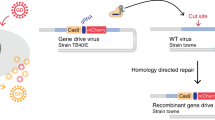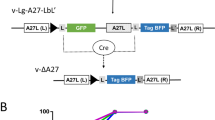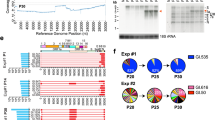Abstract
THE Tsa mutant of polyoma virus (PyTsa) is a conditional lethal mutant isolated by Fried1. PyTsa grows normally at the permissive temperature (31.5° C), but at the non-permissive temperature (38.5° C) there is a failure of normal viral DNA synthesis, and of vegetative growth in mouse cells. Transformation of hamster cells by PyTsa is also inhibited at 38.5° C; this raises the question, Is the mutant gene required simply for the viral induced change in the cell physiology or is it concerned with the stable propagation of the transformed state ? These alternatives can be distinguished by the phenomenon of abortive transformation2.
This is a preview of subscription content, access via your institution
Access options
Subscribe to this journal
Receive 51 print issues and online access
$199.00 per year
only $3.90 per issue
Buy this article
- Purchase on Springer Link
- Instant access to full article PDF
Prices may be subject to local taxes which are calculated during checkout
Similar content being viewed by others
References
Fried, M., Virology, 25, 669 (1965).
Stoker, M., Nature, 218, 234 (1968).
Stoker, M., O'Neill, C., Berryman, S., and Waxman, V., Int. J. Cancer, 3 683 (1968).
Crawford, L. V., Virology, 18 177 (1962).
Author information
Authors and Affiliations
Rights and permissions
About this article
Cite this article
STOKER, M., DULBECCO, R. Abortive Transformation by the Tsa Mutant of Polyoma Virus. Nature 223, 397–398 (1969). https://doi.org/10.1038/223397a0
Received:
Issue Date:
DOI: https://doi.org/10.1038/223397a0
Comments
By submitting a comment you agree to abide by our Terms and Community Guidelines. If you find something abusive or that does not comply with our terms or guidelines please flag it as inappropriate.



